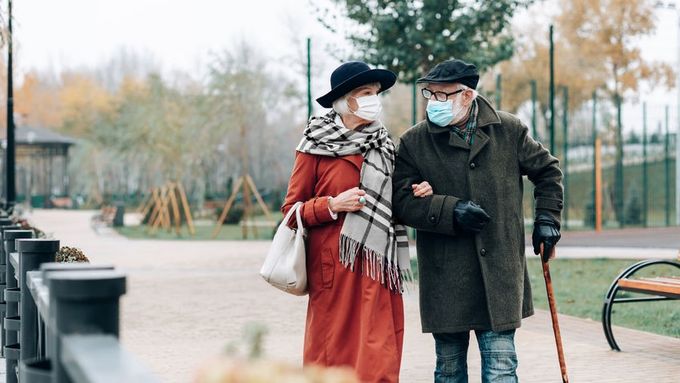Prioritizing Mental Health during the COVID-19 Pandemic
10.12.2020
The coronavirus is not only a risk for our physical health, but also affects our mental health and emotional well-being. Today is the “Day of Action” in Switzerland, which is designed to support people’s mental well-being in times of COVID-19. Nicole Probst-Hensch from the Department of Epidemiology and Public Health at Swiss TPH talks about how research can contribute, and what she does to maintain her own mental well-being.

Taking walks together can help boost mental health. (Photo: 123RF)
How does the corona pandemic affect our mental health?
We know from various studies that stress levels and depression have increased in the population. We are investigating the reasons for this in our study COVCO-Basel. We investigate whether elderly people in particular feel lonely, or whether single parents are overburdened with the organisation of everyday life. We also examine whether job security and protection measures are additional burdens. There are certainly also people who are afraid to leave the house, either because of a fear of infection or because they belong to a risk group. Another aspect that is not yet sufficiently addressed is stigmatisation and exclusion. For example, if a person suffering from asthma has to cough while on a tram, people go and sit somewhere else.
Which population group struggles most with mental health problems caused by COVID-19?
It certainly does not only affect the older population. Children and young adults also suffer during the pandemic. For example, an entire generation of students is deprived of their student life. We also look at the role of social status. After all, it certainly depends on the circumstances of your life with how you can cope with the current situation. It's a difference if you can go to your holiday home in the mountains or if you live in a small flat.
Measures are being taken to reduce the number of cases, to avoid overburdening hospitals and to protect vulnerable groups. Is the mental health aspect somewhat forgotten?
We do not know what the longer-term consequences of the COVID-19 pandemic are on mental health. If the vaccination comes and is successful in bringing the pandemic under control, it is important in the next phase that we see if there are people who will suffer long-term mental damage. This depends very much on resilience. We know from studies in Rwanda and other former crisis countries that some people get over such crises well, while others do not. Further research in this field and support for these people is therefore important.
What should people do if they realise that they feel stress due to the current crisis?
They should start listening to themselves early on, before they push themselves and their family to the edge. Maybe everything needs a little more attention now. People should not wait too long and should not be afraid to seek professional help. A mental illness is just as much an illness as an infection. There are many institutions and support organisations offering help, also by telephone or online.
How can we boost our mental well-being?
Especially during the Christmas season, which is perhaps a little quieter than usual, you can reflect on who and what is good for you and take time for it. Going out in nature and exercising helps to improve your mental health. Doing something good for someone else is also good for yourself. Maybe write a letter again or ask someone to go for a walk with you if you notice that this person is withdrawing from the social environment. The COVID-19 crisis is also an opportunity to bring out the positive aspects. In the longer term, we should consider what we want to change about our own lifestyle. Do I still want to travel around the world, from one place to another, or rather take a holiday nearby? What is my personal contribution to climate change?
What do you do for your own mental well-being?
I always cycle to the office. I sometimes go for a walk during meetings with coworkers instead of a zoom meeting. I watch nice movies and increasingly keep in touch by phone with friends from abroad. And I always make time for my children and husband when they need me.
How can the COVCO-Basel study contribute?
We look at the short and long-term effects on mental health and well-being. As environmental epidemiologists, we also look at the influence of the environment, for example the living environment or the urban environment, on health and well-being. Little is known about this aspect. What is also important is that our research is a two-way street. We receive a great deal of feedback from study participants, which leads to further research topics.
Day of Action
The Day of Action is a joint initiative designed to boost people's mental well-being in times of the COVID-19 pandemic involving the Federal Office of Public Health (FOPH) in collaboration with the Dargebotene Hand, Pro Juventute, Pro Senectute, Pro Mente Sana, Caritas and the Swiss Red Cross, as well as other stakeholders.
Contact

Nicole Probst-Hensch
Professor, PhD (Pharmacy and Epidemiology), MPH
Head of Department, Group Leader, Head of Unit
+41612848378
nicole.probst@swisstph.ch
Stay connected
Subscribe to our newsletter and get all the latest research news, project updates, course and event listings from Swiss TPH.